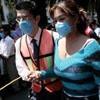Swine flu crisis deepens, control seen as ’unfeasible’
Hurriyet Daily News with wires

refid:11534822 ilişkili resim dosyası
World health officials admitted they were powerless to halt the spread of deadly swine flu and ratcheted up their pandemic alert level to Phase 4 as the epidemic crossed new borders yesterday with the first cases confirmed in the Middle East and the Asia-Pacific region.
Putting an alert at Phases 4 or 5 signals that the virus is becoming increasingly adept at spreading among humans. Phase 6 is for a full-blown pandemic, characterized by outbreaks in at least two regions of the world. Monday was the first time it has ever been raised above Phase 3.
As Mexico, epicenter of the outbreak, said 152 people were now believed to have died from the virus, the number of known cases in the U.S. more than doubled while at least six other countries said they had confirmed their first casualties. In a bid to prevent mass contagion, Mexico canceled school nationwide until May 6, and the Mexico City government is considering a complete shutdown, including all public transportation.
"Confirmation that people have been infecting others in locations outside Mexico would indicate that the disease was spreading beyond travelers returning from the country," The Associated Press quoted World Health Organization, or WHO, spokesman Gregory Hartl as saying.
Authorities around the world tried to contain the spread of the virus, screening air passengers from affected areas and advising against non-essential travel to Mexico. But the WHO said border screenings "don't work," while the EU's health commissioner said there was no need for travel restrictions. "Border controls do not work. Screening doesn't work," Hartl said.
The U.S. defended its "passive surveillance" policy on the emerging swine flu threat, saying that measured, cautious border monitoring makes sense. Governments in Asia - with memories of previous flu outbreaks - were especially cautious. Singapore, Thailand, Japan, Indonesia and the Philippines dusted off thermal scanners used in the SARS crisis and were checking for signs of fever among passengers from North America. South Korea, India and Indonesia announced screening.
Keiji Fukuda, acting WHO assistant chief, said given the widespread nature of the virus, all corners of the world are at potential risk. "I think that in this age of global travel, where people move around in airplanes so quickly, there is no region to which this virus could not spread," Fukuda said. "The outbreak was too widespread to make containment a feasible strategy."
’Pandemic inevitable’
The sense of gloom was compounded by predictions from leading experts that a pandemic was now all, but inevitable. "It is very likely we are at the beginning of a pandemic. We are near there," Yuen Kwok-yung, head of microbiology at the University of Hong Kong, told Agence France-Presse. Dmitry Lvov, head of the Russian Academy of Sciences' Institute of Virology, said: "The risk of a pandemic in the world is very high." No one has died outside Mexico, but more than 50 infected people have been found in the United States, six in Canada and two each across the Atlantic in Spain and Scotland. Possible cases were being tested in Germany, Austria, the Netherlands, S. Korea, Thailand and Australia.
New Zealand said three of 11 people in a school group that visited Mexico had tested positive and it expected the others would also turn out to be positive when tests were completed. "All those affected appeared to have only mild symptoms and had been responding to treatment," Reuters quoted health minister as saying. The sick Israeli carrier, a 26-year-old man, had also recently returned from Mexico. "His condition is good but he is being kept hospitalized for observation," health ministry spokeswoman Einav Shimron said. A honeymooning Scottish couple who recently returned from Cancun, were the first people in Britain to test positive for swine flu.
